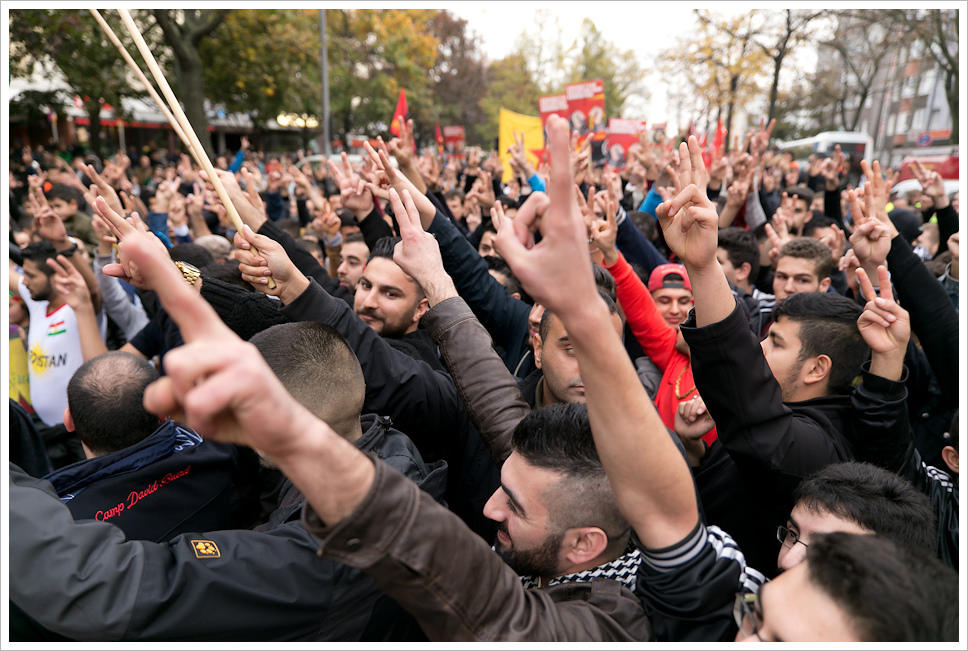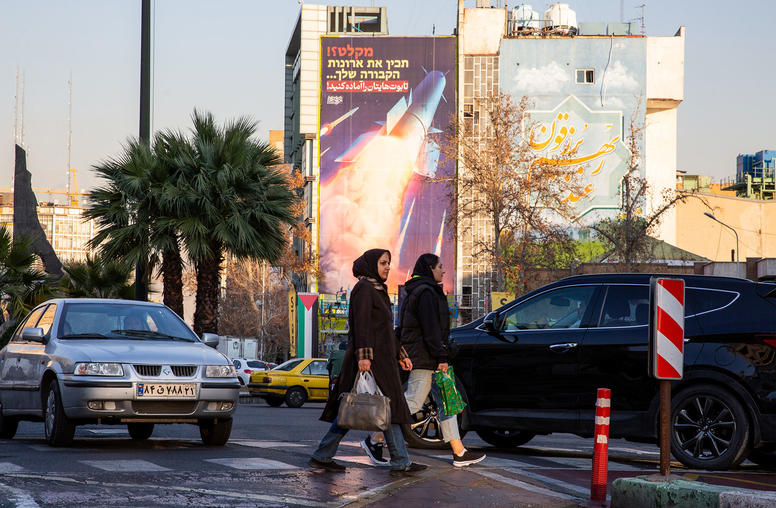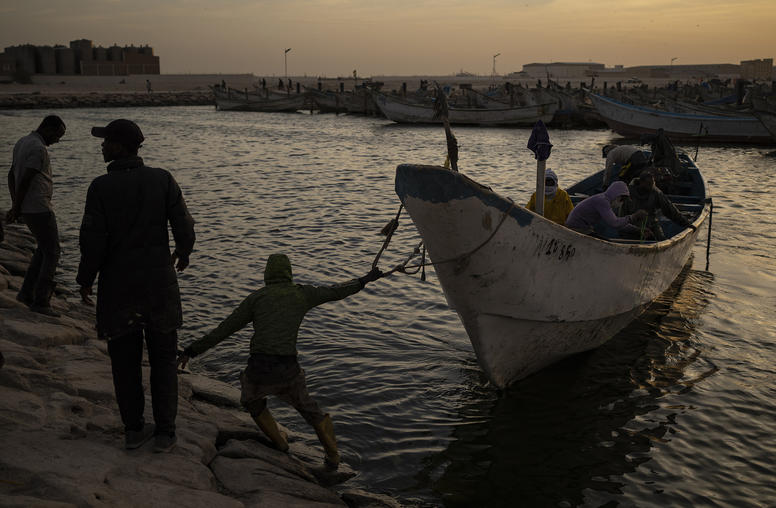The extremist group ISIS exhibits attributes of both an insurgency and a totalitarian regime. Even top U.S. generals acknowledge that military force alone is insufficient to degrade, much less defeat an organization that rules an area larger than the United Kingdom. ISIS will only be weakened through a multifaceted strategy combining diplomatic, economic, political and other means. Organized civilian action that aims to disrupt and deny the group’s key sources of power could be a critical part of that strategy.

Civil resistance can be defined as a strategy of political struggle involving individuals and groups that organize themselves and use techniques such as refusing to cooperate with those in control. That might entail non-cooperation with certain rules or practices or a tenacious collective rejection of the entire system of control. Although the forms and targets of non-cooperation in the case of ISIS will undoubtedly vary by locality, collective disobedience could contribute to an aggressive containment of ISIS and help dissolve its roots by weakening its legitimacy and support base.
“While it is unlikely that core members of ISIS’s punishment brigades will succumb to civic pressure, it is not unthinkable for lower-ranking foot soldiers to begin to question orders.”
Before considering the role of civil resistance, one should assess the motivations and capabilities of this group, also known as ISIL, the Arabic acronym Daesh or the group’s self-conferred moniker “Islamic State.” ISIS’s central political goal is to re-establish an Islamic caliphate, which has not been seen since the dissolution of the Ottoman Empire. Its strategy to achieve this political vision is, first, military conquest to claim control over territory, starting with Iraq and Syria; and second, to establish functional governance in that territory as a means to legitimize its religious authority.
The theoretical and practical challenge for civil resistance scholars is how collective nonviolent action, both within and outside ISIS territory, can be used to disrupt the patterns of cooperation and obedience on which ISIS depends and deny it the human and material resources it needs to wield control. How can sporadic, localized nonviolent action in ISIS-controlled parts of Syria and Iraq be supported and expanded to a significant scale? One approach would be to apply the six sources of power defined by scholar Gene Sharp, the founder of the Albert Einstein Institution, to ISIS and suggest ways they could be severed through civil resistance.
Authority, or perceived legitimacy, is the quality that leads people to voluntarily obey commands, accept decisions, accede to requests or follow suggestions. It is the perceived right to command or direct the actions of others. ISIS’s ideology is coherent and its vision of an alternative religious-political reality is compelling to many Arabs and Muslims disillusioned with the status quo.
Simply declaring ISIS “un-Islamic” is unlikely to make much headway. Instead Islamic scholars, both Sunni and Shia, who are well-versed in Koranic text could offer pointed renunciations of ISIS’s religious interpretations. In addition, the increasing number of recruits and their families, who have grown disillusioned living under ISIS’s rule, could act as powerful counter-voices to the righteous narrative put forward by ISIS.
Social Media and Satire
“In both the short and long terms, the role of organized civilians in challenging extremist, totalitarian ideology and subverting its power is neither negligible nor insignificant.”
Amplifying these voices and their stories—by supporting and coordinating a united social media campaign, for example—could prove a more fruitful course of action for Western governments that have attempted to create and propagate their own counter-narratives. Digital resistance that enables and empowers credible Arab and Muslim voices should be part of any counter-ISIS strategy.
Humor and satire, which have served an important role in Arab culture going all the way back to its ancient poetry, are among the most powerful ways to undermine ISIS’s legitimacy. Humor, according to scholar Majken Jul Sørensen’s research, allows resisters to undermine an oppressor in a manner that is less confrontational than other tactics like protests or street demonstrations and can also help build movement solidarity.
In Raqqa, Syria, ISIS’s de facto capital, humor has become a staple of anti-ISIS resistance. In response to ISIS’s campaign of terror, television networks and social media throughout the Middle East have used comedy to ridicule the group’s radical views. Given that expressions of art and culture are banned in ISIS-controlled areas, which additionally suffer from power cuts and unreliable internet access, the use of humor to strengthen the resistance will likely be most effective in areas outside of ISIS control.
A second source of power for such rulers are the people who obey, cooperate with or give assistance to the powerholders. ISIS didn’t take over large swaths of Iraq and Syria without the active and passive support of many people. ISIS relies on the skills and resources of imams, engineers, tax collectors and a wide array of others in a society to exert control and influence.
But members of these groups are not equally loyal to ISIS, and there have been several documented cases of popular challenges to ISIS policies and practices. One of ISIS’s greatest vulnerabilities is its inability to provide reliable, good-enough governance to those under its control for an extended period of time. Disruptions in service delivery, joblessness and inflation are as problematic for ISIS as they are for official government leaders.
While mass protests are highly risky under ISIS, there are other tactics that could slow or thwart the smooth functioning of its operations: deliberate underperformance in ISIS administration, sharing of important documents and information with activists and outside supporters and nonviolent sabotage of oil production facilities and other infrastructure, for example.
In instances where sources of power range beyond the immediate domestic context, scholars have found that effective civil resistance requires extending the nonviolent battlefield. One example is disrupting the relationship between ISIS recruiters and potential recruits. Hacktivists from groups like Anonymous are already subverting ISIS’s social media communications.
Cross-Section of Support to ISIS
Besides the trigger-pullers and trained jihadis, ISIS also relies on a cross-section of support from municipal governments, banks, information technology firms and others. ISIS will only be able to create and sustain a functioning state if these groups provide the knowledge and know-how required to do their job.
Each of these groups present vulnerabilities for ISIS’s administrative and governance functions if some of their members either fail to perform as they are expected to, or else begin to disobey actively (though likely quietly). Non-cooperation by the business community also could be potentially consequential, though difficult to organize.
A fourth source of power identified by Sharp is the control of natural and other resources, such as money, land, computers, communications and transportation. ISIS commands a sizeable amount of territory and is organized as a highly efficient company, whose operations are fueled through a self-financing business worth an estimated $2 billion. According to a Rand Corporation report cited by the New York Times, ISIS relies on extortion and taxation, taking in more than $1 million per day, to fund its activities.
Preventative action targeting communities in territories abutting or close to ISIS-controlled parts of Iraq and Syria is another way to both deter ISIS activities and deny the organization a steady supply of material resources. Studies reveal that organizations pursuing nonviolent action who were most self-motivated were also the most capable of “nudging” non-state armed groups while remaining resilient to violence. Civilian deaths were lower in places that had high concentrations of autonomous organizations.
This finding suggests that supporting whatever indigenous ability exists for local communities to organize across sectarian divisions would challenge a key facet of ISIS strategy and help strengthen them in the event of a future ISIS attack. For example, in Iraq, active shuttle diplomacy by a group of mediators from the Network of Iraqi Facilitators helped prevent a sectarian-based spiral of revenge violence following the massacre, by ISIS, of 1,700 Shia cadets at Camp Speicher near the city of Tikrit in July 2014.
Sharp also cites intangible sources of power, such as psychological, cultural and ideological factors that promote obedience to and cooperation with those in power. This may include habits, traditions, religious beliefs, language conventions, a sense of belonging or the presence or absence of a common faith, ideology, or sense of mission.
ISIS is tapping into a number of intangibles—notably a desire for identity, belonging and participation in a meaningful enterprise—to attract adherents and fighters. For alienated Muslim youth in particular, the prospect of joining a seemingly powerful, mission-focused organization holds great appeal. Even some Muslim women, facing family and societal pressures and increasingly enabled by social media, are responding to ISIS’s call for participation in the larger-than-life struggle of reconstructing a caliphate.
Honorable, Dignified Lifestyle
Using poignant testimonials by defectors to undermine ISIS’s claim to be providing an honorable, dignified lifestyle to devout Muslims is only part of the solution. Dissolving the roots of ISIS terrorism requires empowering people with the tools and narratives to challenge the injustices that give rise to violent extremism.
Disempowered youth need to be shown alternative means to achieve social justice and political inclusion. Using the rich history of Muslim and Arab-led nonviolent struggles as a cultural reference, and dramatizing these struggles and their leaders using popular media and educational tools, needs to be part of a longer-term solution to extremism.
The final source of power in Sharp’s list of six is punishment of those who disobey, typically by seizure of assets, imprisonment or execution. ISIS is infamous for its use of penalties, often brutal, to terrorize the populations under their control and to deter dissent.
Making ISIS’s use of corporal punishment backfire politically would be the goal of any potential nonviolent action. According to Brian Martin, there are two conditions for “backfire.” First, an action is perceived as unjust, unfair, excessive or disproportional. Second, information about the action is communicated to relevant audiences.
Certain ISIS actions have provoked counter-mobilization and resistance by those living under the group’s control. There have been isolated instances of ISIS releasing political prisoners in response to organized protests by women and others. While it is unlikely that core members of ISIS’s punishment brigades will succumb to civic pressure, it is not unthinkable for lower-ranking foot soldiers to begin to question orders. The more organized and unified the community is, the greater the chance that such questioning, and potentially changed behavior, would occur.
ISIS keeps its grip on power by inserting itself in all aspects of societal life and by destroying any sort of autonomous political action. In this way, ISIS exhibits features of both a totalitarian regime and a socio-religious movement.
'Greatest Threat to Totalitarian Rule'
German philosopher Hannah Arendt’s ruminations about totalitarianism and its vulnerabilities are instructive in terms of possible civil resistance responses to ISIS: “The greatest threat to totalitarian rule, and the main target of total terror, is human spontaneity or ‘man’s power to begin something new out of his own resources, something that cannot be explained on the basis of reactions to environment and events.’
Arendt recognized that human agency and eruptions of spontaneous political action are threatening to totalitarian regimes. This type of political action is extremely difficult in full-blown totalitarian dictatorships. However, it is not unimaginable. We have seen spontaneous outbursts of protest activity lead to small victories in ISIS-controlled parts of Iraq and Syria. These incidents should be further studied for what allowed the local communities to exert leverage over ISIS, so that models could be developed for support to such actions.
If ISIS perpetuates its totalitarian-esque control by blocking any sort of autonomous collective action, then the civil resistance antidote is to support self-organization in various forms. An organized population that demonstrates the ability and inclination to act independently of ISIS is a threat to the group.. Local organization can take different forms, especially since protests and direct confrontations may be inappropriate in many cases.
Outsiders—governments and international non-governmental organizations—can support community resilience and subtle forms of non-cooperation with ISIS by helping Syrians and Iraqis create parallel structures and institutions. Practically, this entails providing educational materials and medical supplies to Iraqi and Syrian men and women who may be leading underground schools and medical clinics. It means offering trauma support to those who have been victimized by ISIS and are struggling to re-enter normal life. It requires supporting alternative media and communication channels and getting non-ISIS news and information into the territories it controls and into adjacent areas. This also involves supporting authentic local and regional voices with the cultural heft and legitimacy to challenge the absurdity of ISIS tyranny.
Furthermore, attempting to dismantle ISIS without addressing the severe governance failures and venal corruption that fueled its rise is futile. The civil war in Syria is the greatest humanitarian catastrophe of our time. The displacement, destruction and despair resulting from the war, spurred on by dictatorial criminality and regional proxy conflicts, gave rise to ISIS in Syria and are sustaining its presence there.
A political solution to the Syrian civil war that includes a regional accord involving Iran and Saudi Arabia, and a greater investment in those Syrian individuals and organizations that are capable of mediating across conflict lines, may be the only way to eliminate ISIS in the long term. In addition, strengthening inclusive, representative governance in Iraq, Libya, Tunisia and other countries that have spawned ISIS recruits will help dry up the roots of violent extremism.
In both the short and long terms, the role of organized civilians in challenging extremist, totalitarian ideology and subverting its power is neither negligible nor insignificant. Countering extremist narratives by amplifying local and regional voices capable of making a compelling religious, social and cultural case against ISIS is an essential role for those outside seeking a resolution of this devastating conflict. Counter-narratives, in turn, should be backed by organized collective action and support for autonomous political, economic and social activities. Investing in the strengthening of this type of people power is relevant not only for the fight against ISIS, but for the injustices and governance failures that catapulted its rapid spread.
Maria J. Stephan is a senior policy fellow at the United States Institute of Peace (USIP) and a nonresident senior fellow at the Atlantic Council. A more extensive version of this article was first published in the Journal of Resistance Studies Volume 1, Number 2 – 2015 and is available free of charge through that site’s shopping cart feature. The author would like to thank Chelsea Dreher, Danny Hajjar and Siree Aller for their research assistance.



